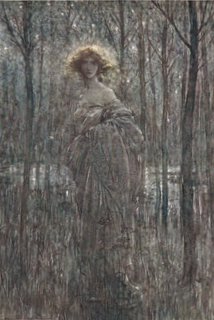more on Celan - TODESFUGE
This is me trying to interpret the poem.
*Repetition of abends, nachts in 1st 2nd 3rd and 4th stanzas causes feeling of inescapability, unavoidability, just as night falls without fail. There is no daylight in this poem, only a sense of the light is constantly disappearing: the repetition of dunkelt, dunkler reinforces the night-time imagery.
*The repetition of abends, nachts becomes rhythmic, so we expect them to continue at similar intervals but are surprised in the 4th stanza when it is interrupted by Tod, Meister, Deutschland. Thereby associating nightfall (a kind of ending), Tod (ending) with Meister and Deutschland.
*A few points about the repetition of Wir trinken..., Wir trinken..., Wir trinken und trinken
-begins first with Sie as the object, later shifts to Dich, which involves the reader more personally: an accusation?
-They drink it mittags, morgens, nachts, abends, and are constantly consuming it. Like a meal, swallowed, used up, burnt up. Repeated and repeated, because author is talking about millions of people.
-They drink without choice. No one would choose to drink Schwarze Milch der Fruhe, the black milk of daybreak.
*Schwarze Milch der Fruhe:
-is it der Fruhe as a contrast to the night-time and darkness in the rest of the poem?
-At daybreak, the prisoners have no 'new day' to look forward to, their experience will be the same as the day before, so their new day is rotten, like black milk.
-Contrast also in that milk has connotations of mother, care, something fed upon when dependent. So this black milk is their starvation rations, the sick milk of their captors who ironically, their dommed lives now depend on.
-it is also simply an image of sickness, impossibility. How can you drink black milk, there's no such thing? = How can this have been allowed to happen?
*Ein Mann, "er", becomes the actor in the first stanza. He gives orders. By the 4th stanza, Tod ist ein Meister aus Deutschland. We associate this man and death, Death is giving orders.
*When the image is first presented, "Wir schaufeln ein Grad in den Luften da leigt man nicht eng", sounds free. Free in the air, my first impression was of the freedom in death. "Nicht eng" could be as in the camps' dormitories. "Nicht eng" = Lebansraum, so a connotation of National Socialist imagery and propaganda. How ironic that there was room for so much death.
-In the 1st and 2nd stanzas, 'We shovel a gave in the air', then in the 4th stanza, 'We have a grave in the clouds'. So the verb changes from shovel schaufeln to have habt. They dug their own graves, sometimes literally, sometimes metaphorically.
-'Wir" schaufiln ein Grab in den Luften: compared to Er pfeift seine Juden hervor laesst schaufeln ein Grab in der Erde. So, 'we' shovel in the air, but when the image is more solid, of digging graves in the ground, it is no longer 'we' but "his Jews", acting under 'his' orders.
*seine Ruden herbei: seine Juden hervor - all are his possessions, he is clearly superior. But he prefers his dogs to be closer to him than his Jews.
*Deutschland = goldenes Haar Margrethe
Doomed Jews = aschenes Haar Sulamith
In the 1st stanza, it could be a soldior writing to his beloved, a golden haired Aryan.
Aschenes Haar in the 2nd stanza importantly introduces the idea of burnt hair. Ironic in calling it 'Aschenes'. God that's terrible genius.
-golden hair juxtaposed with Deutschland; ashen hair juxtaposed with grave digging.
More later on playing and the snake, writing and the house...


 bravenet.com
bravenet.com
